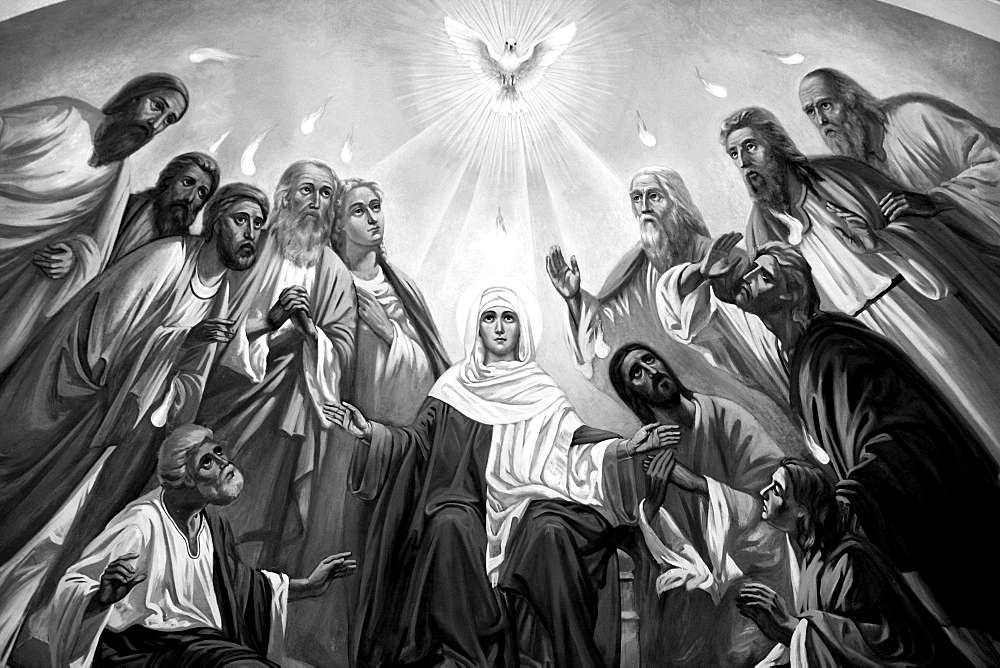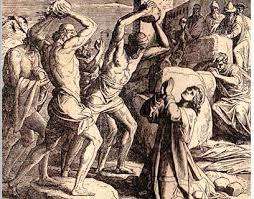

The Holy Spirit: Power to Overcome Obstacles in Mission
Dr. Shaibu Abraham
Throughout Scripture, the Holy Spirit is depicted as God's empowering agent, carrying out special tasks in the world. In the Old Testament, individuals like judges, kings, and prophets were endowed with the power of the Spirit to carry out administration, protect God’s people from enemies, and defeat hostile forces. Prophets, in particular, were empowered by the Spirit to deliver Yahweh’s messages to the people of Israel during times of disobedience and rebellion. The Spirit acted as God’s agent, dispensing power and authority to specially chosen individuals to fulfil God's mission in the world.
There are references to the Spirit of God as a dynamic, empowering force. One of the most significant references is in the prophecy of Zechariah, where the angel's address to Zerubbabel, governor of Judah: "This is the word of the Lord to Zerubbabel: 'Not by might, nor by power, but by my Spirit, says the Lord of hosts. What are you, O great mountain? Before Zerubbabel, you shall become a plain; and he shall bring forward the top stone amid shouts of 'Grace, grace to it!'" (Zech. 4:6-7). These remarkable words, addressed to Zerubbabel regarding the postexilic rebuilding of the temple, affirm that it was through the Spirit’s empowerment—not human effort—that the “mountain” of obstacles and difficulties only would be levelled and the task completed. Similarly, in the New Testament, we see many instances where the Spirit enables God's people to overcome obstacles and opposition from both human and demonic forces. Whether in the Old Testament or the New Testament, the Spirit serves as the 'enabler' of God's mission in the world. Therefore, in the following pages, we will explore how the Spirit empowers missionaries to carry out their tasks and bring people to Jesus Christ.
The Holy Spirit: The Missionary Spirit
As we turn our attention to the New Testament, the missional role of the Spirit is seen more intensely and in greater detail than the Old Testament. John the Baptist was filled with the Spirit to prepare a people for the advent of Christ; the Spirit came upon Mary to bring forth the Son of God; Zechariah prophesied under the anointing of the Spirit concerning "the horn of salvation" God had raised up; and Simeon, led by the Spirit, took the child Jesus and blessed God for His coming salvation.
The work of the Spirit in relation to Jesus and His mission is abundantly portrayed in the Gospels. At Jesus' baptism, the Spirit descended upon Him and empowered Him for the God-given task of His earthly mission. The Gospel of Luke places special emphasis on the Spirit’s role in the life and ministry of Jesus. His ministry began just after His baptism and the descent of the Holy Spirit upon Him. With the coming of the Spirit, Jesus became the "Anointed One," also known as "the Messiah" or "the Christ." This anointing enabled Him to carry out His ministry and mission. Luke highlights the Spirit’s unique influence on Jesus’ ministry.
The Holy Spirit: The Power against Devil
When Jesus began His ministry, He was filled with the fullness and power of the Holy Spirit. Luke writes, “And Jesus returned in the power of the Spirit to Galilee” (Luke 4:14). He taught with great power (Lk. 4:15–22), healed the sick, and cast out demons from all who were oppressed (Lk. 4:31–41). Jesus explicitly states that the power behind His exorcisms was the Spirit: “But if it is by the Spirit of God that I drive out demons, then the kingdom of God has come upon you” (Matt. 12:28; Luke 11:20). Jesus, then explains the power of the Spirit in him to overpower the satanic forces, “When a strong man, fully armed, guards his house, his property is safe. But when someone stronger attacks and overpowers him, he takes away the armour in which the man trusted and divides the plunder” (Luke 11:21–22). He says this in the context of casting out a demon and total deliverance of a mute person (Luke 11:14). Jesus illustrates that unless the "strong man" (representing Satan and his forces) is defeated by "someone stronger" (Jesus himself), his "possessions" (people under his influence) cannot be freed. However, when someone stronger overpowers him, his possessions are plundered (Luke 11:21–22). Furthermore, the “strong man's house” in this context symbolically refers to a city, town, neighbourhood, or community. In the highly organized kingdom of darkness, a ‘strongman’ is often placed in control of such ‘houses.’ The ‘goods’ in the house are the people, often under the influence of the devil. Unless the devil is bound, it is impossible to free people from bondage.
The Gospels point out that Jesus came to the world to conquer Satan’s kingdom. Besides, Jesus sent His disciples out with the instruction: “Heal the sick, raise the dead, cleanse lepers, cast out demons” (Matt. 10:7–8). It is evident that deliverance from demonic spirits, like healing, is one of the attestations of the gospel of salvation. When people are delivered, it serves as an extraordinary sign of God's power, confirming the message of new life in Christ. As stated in Mark 16: “These signs will accompany those who believe: in my name they will cast out demons…” (v. 17), resulting in “confirming the message by the signs that accompanied it” (v. 20). When people witness the supernatural power of God in delivering the demon-possessed, healing and other miracles, they accept the message of salvation.
Moreover, Jesus recognized Satan as the prince of this world (Jn. 12:31). After deceiving Adam in the Garden of Eden, Satan became the de facto ruler of the world and has since manifested great power. He is the reason many are not saved, as he blinds and hardens their hearts (2 Cor 4:4). Satan is the god and ruler of the evil systems and practices in the world. His goal is to prevent people from being saved through deceit and falsehood and numerous other evils. According to Ephesians 6:10-12, there are several categories of evil powers: rulers, authorities, cosmic powers of darkness, and spiritual forces of evil in the heavenly places. These evil powers are Satan's minions, bringing evil, violence, death, and other troubles to the world.
The Power of the Spirit for Mission
The power of the Holy Spirit is not limited to the ministry of Jesus alone. Jesus instructed His disciples to tarry in Jerusalem and promised that they would “be baptized with the Holy Spirit not many days from now” (Acts 1:4–5). He further assured them, “But you will receive power when the Holy Spirit has come upon you, and you will be my witnesses in Jerusalem, in all Judea and Samaria, and to the ends of the earth” (Acts 1:8). Why did Jesus ask His followers to wait for the Holy Spirit? The reason was that they needed the Spirit’s power to be His witnesses. They could not effectively proclaim His message to the world without the supernatural empowerment of the Holy Spirit.
The moment the Holy Spirit descended in the Upper Room, the fearful apostles transformed into bold proclaimers of Christ’s saving grace. The Spirit transformed them from being confined within the four walls of a room to people who turn the world upside down (Acts 17:6). The power of the Holy Spirit enabled them to testify about Christ. Peter, "standing with the eleven," lifted his voice and addressed the crowd, “Men of Judea and all who dwell in Jerusalem, let this be known to you, and give ear to my words" (Acts 2:14). Here, Peter, an uneducated, common man—a fisherman—spoke as he had never spoken before. He addressed an assembly of devout Jews with authority that could only come from the anointing of the Holy Spirit. The coming of the Holy Spirit made a powerful and effective witness possible.
Besides, this witness occurred in an extremely challenging situation. Peter delivered his message to an audience that was not friendly and was deeply conservative in their beliefs. Yet, Peter boldly proclaimed that they had crucified Jesus. Remarkably, no one raised their voice against the message; instead, they readily repented of their sins, asking, "Brothers, what shall we do?" Undoubtedly, Peter's message was fully anointed by the Holy Spirit. It is clear that the coming of the Spirit enabled an ordinary human being, in a humanly impossible situation, to become a channel for the radical transformation of human lives. “Jews, devout men from every nation under heaven” (Acts 2:5) suddenly realized and accepted their immense guilt for crucifying the Messiah God had sent. They were then baptized in the name of Jesus and joined the church. This amazing transformation could only have been made possible through the tremendous power of the Holy Spirit, who anointed and empowered a human witness to bring about such a change.
Power of the Spirit in Cross-Cultural Mission
When persecution broke out against the church in Jerusalem, Philip went to a city in Samaria, where he "proclaimed to them the Christ" (Acts 8:5). The situation in Samaria was more difficult than what Peter had faced in Jerusalem at Pentecost. Jews generally viewed Samaritans as out-castes and untouchables and avoided them entirely, counting them to be outside of God’s promises. The Samaritans, in turn, were equally antagonistic toward the Jews, especially those from Jerusalem. Therefore, Philip had to cross a wide cultural barrier to preach the gospel in Samaria. The challenge was further compounded by the fact that the Samaritans of the city were enchanted by an individual - Simon, a magician - whom they regarded as the very powerful: "They all gave heed to him, from the least to the greatest, saying, 'This man is the power of God that is called Great'" (Acts 8:10). It is evident that the people were under the influence of satanic forces through Simon the magician. This was truly a difficult mission field, and humanly speaking, it seemed impossible to reach this place with the gospel. From a human perspective, there was utterly no chance of success. Yet, "they believed Philip as he preached good news" (Acts 8:12).
How could the gospel penetrate the hearts and minds of these people so that they believed in Jesus? The answer is that Philip bore witness to Jesus and he did so in the power of the Holy Spirit, for he was a man "full of the Spirit and of wisdom." Through the anointing from "on high" (Luke 24:49), the miraculous salvation of the Samaritans took place.
Power of the Spirit in Gentile/Foreign Mission
A similar empowerment for ministry is described later in Acts, when Saul of Tarsus was filled with the Holy Spirit. Ananias, the disciple who ministered to Saul, was instructed by the Lord: “Go, for he is a chosen instrument of mine to carry my name before the Gentiles and kings and the sons of Israel; for I will show him how much he must suffer for the sake of my name” (Acts 9:15–16). After Saul (Paul) was filled with the Spirit, he “grew more and more powerful” (v. 22). Following his conversion and being filled with the Holy Spirit, Paul immediately began proclaiming Jesus in the synagogues, saying, “He is the Son of God” (Acts 9:20). His witness, empowered by the Spirit, was so effective that he “confounded the Jews who lived in Damascus by proving that Jesus was the Christ” (v. 22).
Later in the second missionary journey (Acts 16:6-18:22), Paul, accompanied by Silas, Timothy, and Luke, was forbidden by the Holy Spirit to preach the gospel in Phrygia, Galatia, and Bithynia (Acts 16:6-7). However, through a night vision, they were redirected toward Macedonia (Acts 16:9-10). Guided by the Spirit, they travelled for four hundred miles and reached Philippi (Acts 16:11-12). There, through Paul's preaching, Lydia became the first person to convert to Christianity. She and her household were baptized, becoming the first converts in Europe (Acts 16:13-15). Subsequently, a slave girl possessed by a spirit of divination was delivered (Acts 16:16-18), leading to the salvation of a jailor and his family (Acts 16:25-34). Indeed, it was the Holy Spirit who directed and empowered this missionary endeavour, thus Paul and his companion were able to establish a beautiful church in the city.
In a similar vein, in the city of Ephesus, Paul and his companions encountered a spiritual battle of enormous magnitude (Acts 19). Ephesus was a principal centre of magic in the ancient world, renowned for the temple of Diana, a hub of idol worship and evil practices. Many in the city were involved in witchcraft and other occult practices, manipulating supernatural power for their own ends. However, there was a powerful manifestation of the Spirit through Paul, and some disciples of John the Baptist were filled with the Spirit (v.6). In a strange event, some itinerant Jewish exorcists were attacked by a demon possessed man, resulting in the extolling of Jesus' name in the city (vv.13-17). Moreover, through Paul's missionary activities, many abandoned their practices and publicly burned their magic books. It is evident that many joined Paul and became Christians, leading to the establishment of the church in Ephesus.
Power of the Spirit for Contemporary Mission
This truth still applies today. We cannot effectively preach the gospel or penetrate the hearts of those trapped in false teachings, under the grip of evil forces, or influenced by secular ideologies unless the Holy Spirit, both empowers us and softens the hearts of the listeners. The Spirit would bring power, and in that power, we are commanded to bear witness to the entire world. It is not merely energy that the Holy Spirit would provide us but the Spirit Himself is with us. The Holy Spirit would personally empower his people for the mission ahead, and Jesus’ authority would be with them. Luke emphasizes that we cannot succeed in Christ’s mission without Spirit’s power. Jesus had already set an example of this dependence on the Spirit in Luke’s Gospel (Lk. 4:18).
The biblical examples above clearly show that the Holy Spirit is a "missionary Spirit" and an "enabler of mission." This is clearly evident in the contemporary Pentecostal and charismatic context, where mission is carried out in the power of the Spirit. There is a renewed emphasis on the gift of the Spirit as the power for witnessing. Those who receive this gift become Christ's witnesses, and through their missionary activities, they impact others with God's presence and power. They bring healing, deliverance, and comfort to the suffering, drawing many into the kingdom of God.
In summary, wherever the Spirit comes upon people, they are empowered to move beyond themselves and become witnesses for Christ. The Spirit enables missionaries to overcome obstacles to mission work, including satanic forces that oppose salvation. It is not only missionaries, even believers are empowered by the Spirit and with the authority of the Lord to bind the ‘strongman.’ By the Spirit's power and the Lord's authority, they participate in the ongoing outreach of the gospel to the ends of the earth.


















